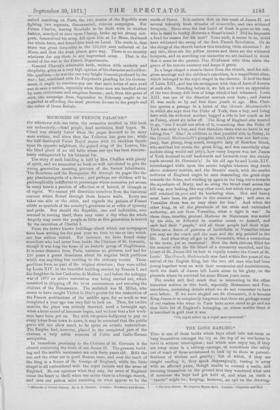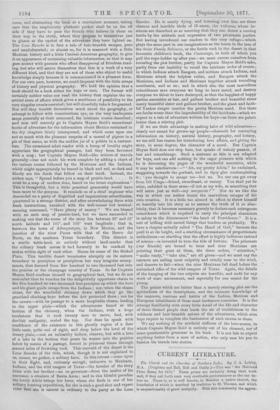THE LONE RANCHE.*
Tuts is one of those books which boys climb into nut-trees or bury themselves amongst the ivy on the top of an out-house to revel in without interruption ; and which men enjoy too, if they are away alone in a railway-carriage, or somewhere else safely out of reach of those accustomed to look up to them as personi- fications of wisdom and gravity ; but of which, if they are caught reading it, they speak disparagingly, Wading it away with an affected yawn, though unable to conceal a smile, and excusing themselves on the ground that they wondered what sort of nonsense the boys had got hold of, and what on earth a "rancho" might be ; keeping, however, an eye- on the drawing- * The Lone /innate By Oainala Mayne Heil London: Chairman and Hall.
room, and abstracting the book at a convenient moment, taking care that the suspiciously plethoric pocket shall be on the off side if they have to pass the friends who believe in them on their way to the study, where they propose to themselves just to glance at the upshot of the adventure they have lighted on. The Lone Ranche is in fact a tale of hair-breadth escapes, pure and unadulterated ; or almost so, for it is seasoned with a little Mexican history and a little Central-American geography, to give it an appearance of containing valuable information, so that it may pass muster with parents who affect disapproval of frivolous read- ing, but who will assure themselves that this is a work of a very different kind, and that they are not of those who object to useful knowledge simply because it is communicated in a pleasant form. For our own part, however, we could dispense with the little scraps of history and physical geography. We hold the opinion that a book should be a book either for boys or men. The former will certainly neither value nor read the history that explains the un- settled state of affairs which gives a semblance of possibility to the very singular events narrated ; but will cheerfully take it for granted. Nor will they troubles themselves much about the geography, or attempt to follow with conscientious eye, on the very inadequate maps generally at their command, the intricate routes described ; and men will scarcely go to Captain Mayne Reid's sensational books of adventure for the information about Mexico contained in the dry chapters thinly interspersed, and which come upon one not so much with the pleasant surprise of a morsel of pigeon in a pie of that name, as with the sudden jar of a pebble in a currant- bun. The occasional adult reader with a bump of locality might appreciate the geographical passages, had they been favoured with a map ; but Captain Mayne Reid—like writers of travels generally—has not made his work complete by adding a chart of the various routes followed by the Mexicans and the Indians, which might appropriately be traced in black and red, so dark and bloody are the deeds that follow on their track. Instead, the
author says, 46 Spread before you a map of prairie-land It must be a map of modern time, based on the latest explorations." This is thoughtful, but a little practical generosity would have been more to the purpose. It reminds us of a chief engineer who descended on a party of dispirited and impecunious subordinates, quartered in a strange district, and after overwhelming them with fresh instructions, vanished with the well-meant but ironical- seeming command, " Have plenty of money." We are blessed with no such map of prairie-land, but we have succeeded in making out that the scene of the story lies between 30° and 35° north latitude and 101°. and 105° west longitude ; that is, between the town of Albuquerque, in New Mexico, and the junction of the river Pecos with that of the Bravo del Norte, on the southern Texan boundary. This district is a sterile table-land, so entirely without land-marks that the solitary track across it had formerly to be marked by stakes within sight of each other. Hence its name of the Staked Plain. This terrible desert terminates abruptly on its eastern boundary in precipices or precipitous but very irregular escarp- ments, that descend from five hundred to two thousand feet into the prairies or the champagn country of Texas. So far Captain Mayne Reid confines himself to geographical fact, but we do not remember that he vouches for the delightfully opportune chasm in the five-hundred-to-two-thousand-feet precipice up which the hero and his giant guide escape from the Indians ; nor, when the chasm closes, for the wonderful chimney down which they go like practised climbing-boys before the Act protected them ; nor for the cavern—with its passage to a more hospitable chasm, leading to the upper plain—which the adventurers found at the bottom of the chimney, when the Indians, with a huge tombstone that it took twenty men to move, had, with devilish malignity, sealed the top. Nor does he speak with confidence of the existence in this ghostly region of a dear little oasis, quite out of sight, and deep below the level of the dreary plain,—not an unhealthy hollow, observe, but with a love of a lake in the bottom that pours its waters into the prairies below by means of a passage, forced in primeval times through several miles of frowning rock. This emerald of the desert is the Lone Rancho of the title, which, though it is not explained to us, means, we gather, a solitary farm. In this retreat —comeupon in their flight, and, curiously enough, unknown to Mexicans, Indians, and the wild rangers of Texas—the heroine of the story hides with her brother—an ex-governor—from the malice of his successor, a creature of Santa Anna ; and to this blissful paradise the lovely Adela brings her lover, whom she finds in one of her solitary hunting expeditions, for she is such a good shot and expert rider that she is caterer in ordinary to the party at the Lone
Ranche. He is nearly dying, and hovering over him are those obscene and horrible birds of ill-omen, the vultures, whose in- stincts are described as so unerring that they can detect a coming battle by the attitude and expression of two proximate parties. But having introduced our readers to this cosy refuge—which plays the same part in our imaginations as the house in the tree of the Swiss Family Robinson, or the fertile rock in the desert in that favourite children's book, the Castaways, in both of which you pull the rope-ladder up after you—we must excuse ourselves from revealing the plot further, partly for Captain Mayne Reid's sake, partly from our inability to recall the intricate order of events ; in which Indians attack Rangers, and settlers attack Indians, and Mexicans attack the helpless exiles, and Rangers attack the Mexicans, and Indians and Mexicans together attack travelling merchants, and so on ; and in which also the most marvellous coincidences save everyone we long to have saved, and destroy everyone we thirst to have destroyed, so that the happiest of happy parties assembles at last, and gallant brother and beautiful sister marry beautiful sister and gallant brother, and the giant and faith- ful Yankee ranger marries the pretty Mexican maid. But there are faults worse than the improbability of the'incidents—which we expect in a tale of adventure written for boys—as there are points better than a stirring plot.
If we see little advantage in making take of wild adventure— clearly not meant for grown-up people—channels for conveying information on history, natural history, geography, and botany, we see still less reason for introducing love affairs, and giving the story, in some degree, the character of a novel. But Captain Mayne Reid does not stop here, but speaks of unholy passion, of lust and concubinage. Such a sentence as this is not adapted for boys, and can add nothing to the eager pleasure with which be is devouring the pages of the wonderful narrative, while it may be mischievous : —" Ah, my pretty Adele!' he exclaimed, staggering towards the portrait, and in tipsy glee contemplating it ; you thought to escape me—but no. No one can get away from Gil Uraga—friend, sweetheart, or enemy. You shall yet be mine, enfolded in these arms—if not as my wife, as something that will serve just as well—my margarita 1' " Nor do we like the way in which our author treats the marvellous escapes of his own creation. It is a little too absurd to affect to throw himself an heartily into his story as to assume the truth of it so abso- lutely, that it becomes necessary gravely to declare each outrageous coincidence which is required to carry the principal characters in safety to the dtinouement " the hand of Providence." It is a. sort of trifling with sacred things that borders on profanity. We have a chapter actually called " The Hand of God," because the peril is at its height, and a startling circumstance of proportionate unlikeliness—so startling that the effect is highly ludicrous instead of solemn—is invented to turn the tide of fortune. The prisoners (our friends) are bound to trees and nine Mexicans are pointing their guns at them, the three orders, " attention," " make ready," " take aim," are all given—and we must say the rescuers are sailing most culpably and cruelly near to the wind, and deserve to fail—when the nine Mexicans fall dead before the ambushed rifles of the wild rangers of Texas. Again, the details of the hanging of the two culprits are horrible, and unfit for any work of more amusement, and especially for one meant for the young.
The points which are better than a merely stirring plot are the spiritedness of the descriptions, and the intimate knowledge of the manners, customs and habits of the Indian, Mexican and European inhabitants of those semi-barbarous countries. It is the strange familiarity with every little detail of the life and character of these distant people that lends the air of truthfulness to the wildness and hair-breadth nature of the adventures, which even boys require to complete the fascination of such stories as these.
We say nothing of the artificial stiffness of the love-scenes, in which Captain Mayne Reid is entirely out of his element, nor of some questionable grammar in his book. It is not fair to expect anything better from a man of action, who only uses his pen to fashion his travels into stories.































 Previous page
Previous page